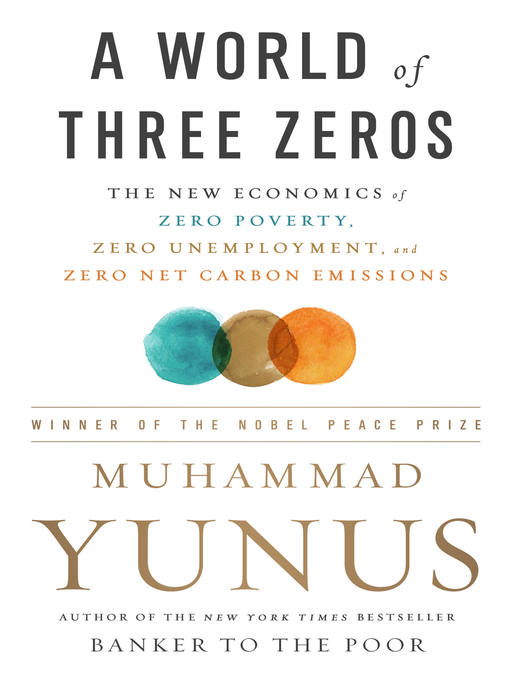
A World of Three Zeros
The New Economics of Zero Poverty, Zero Unemployment, and Zero Net Carbon Emissions
کتاب های مرتبط
- اطلاعات
- نقد و بررسی
- دیدگاه کاربران
نقد و بررسی

August 28, 2017
Yunus (Banker to the Poor), a Noble Prize winner and founder of the Bangladesh-based Grameen Bank, which pioneered microcredit, describes himself as “fundamentally optimistic about the future.” That optimism permeates his argument that the capitalist system’s economic framework, driven by personal interest, is broken and must be redesigned so that “both personal and collective interests are recognized, promoted, and celebrated.” Yunus’s preferred vehicle for this redesigned economy is the so-called social business, which aims not to enrich investors but improve people’s lives and make the world better. Yunus explains how social businesses can help reduce poverty, unemployment, and environmental degradation. He then examines the “megapowers” that he believes are crucial to his vision of world transformation: young people, old people, technology, good governance, and human rights. Along the way, he expresses his support for fair, free global trade. The book is packed with true-life examples, many from Yunus’s own experiences with Grameen Bank. Though the sparseness of financial data in the text is a weakness, Yunus offers sound recommendations to distribute global wealth more equitably through individual and systemic support for small-scale entrepreneurship.

August 1, 2017
A book to make Wall Street quake--if Wall Street paid attention to the developing world.The classic description of capitalism, writes Bangladeshi economist and Nobel Peace Prize laureate Yunus (Building Social Business: The New Kind of Capitalism that Serves Humanity's Most Pressing Needs, 2010, etc.), assumes that the free market imposes curbs on economic inequality. In fact, it does not work that way, and inequality is growing markedly across the world, requiring a rethinking of the tenets of not only free-market capitalism, but also the marketplace. Such a rethinking, by the author's account in this hortatory but accessible text, makes room for a hybrid "social business" that is not quite for-profit and not quite nonprofit but something that partakes of both while leveraging the human propensity for selflessness. In this regard, Yunus' experiments in microfinance and microcredit, loaning small sums of money to businesspeople actual and aspiring, are cases in point. At the same time, he adds, a re-envisioned economics will recognize that humans are naturally entrepreneurs, best served not by jobs as such but by opportunities to make their own ventures in the marketplace. Again, his microfinancial work "introduced a new program of offering new-entrepreneur loans from Grameen Bank to support...efforts to create businesses" on the part of young Bangladeshis. Entrepreneurship catering to the mass market, Yunus argues, will prove more sustainable in the end than "trying to sell a few more luxury goods to a handful of wealthy people who already have more things than they will ever need." A third plank of a revised economics includes sustainable, clean energy, which Yunus believes developing nations are better positioned to adapt than many advanced economies, precisely because they are more of a blank slate. While antithetical to the prevailing capitalism, the author's reforms, he insists, will yield an economic system that more closely corresponds to who humans really are: partners and not predators. The author's humane proposal for economic reform, far from impractical, makes for provocative reading for development specialists.
COPYRIGHT(2017) Kirkus Reviews, ALL RIGHTS RESERVED.

October 1, 2017
Yunus, winner of the Nobel Peace Prize and originator of microcredit, calls for capitalism to be more inclusive. He outlines a new economic system incorporating human selflessness, entrepreneurship, and opportunities for the poor. He espouses creating businesses that prioritize social outcomes over investor profits. In a social business, explains the author, the entrepreneur repays any invested capital within a period of time and then reinvests future profits to operate and expand the business. Yunus sets as goals eliminating poverty, unemployment, and environmental degradation. He demonstrates the possibilities of his vision with myriad examples including beekeeping in Kenya, industrial waste recycling in Japan, and solar energy in Bangladesh. Yunus further connects his work to the UN's global development goals and is optimistic that positive change will be accomplished by harnessing the enthusiasm of young people; redirecting technological innovation to meet social needs; and making governments stable, fair, and efficient. VERDICT With wealth disparity an ongoing global concern, Yunus's inspiring and hopeful message is a must-read for all readers with even a semblance of economic literacy.--Lawrence Maxted, Gannon Univ. Lib., Erie, PA
Copyright 2017 Library Journal, LLC Used with permission.

























دیدگاه کاربران